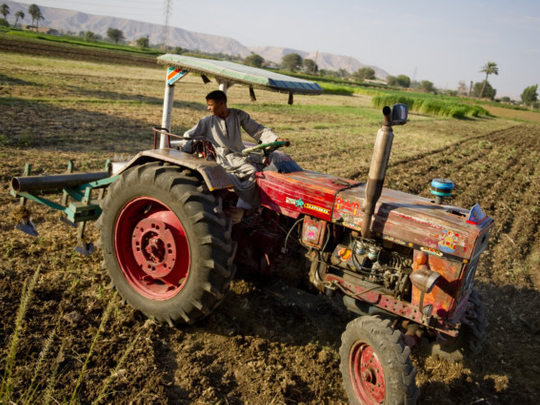
Qaliubia, Egypt: Clutching a handful of dried soil from his farmland in the province of Qaliubia near Cairo, Sarhan Shehata, fumes: “What does the government want from us? Its decision to increases prices of fertilizers is like a death sentence against the Egyptian famer and agriculture in this country.”
Shehata, a father of five, is one of millions of Egyptian farmers, who have reacted with anger to a decision by the government to partially cut state subsidy on fertilizers.
The move has resulted in an increase of 33 per cent in the official price of fertilizers, coming ahead of the winter season when farmers traditionally cultivate wheat. Egypt with a population of around 87 million is the world’s top wheat importer.
“Even before this bad decision, we could not bear the cost of farming, including the high prices of workers and pesticides,” Shehata, 51, told Gulf News. “What will our state of affairs be like now? It would be better to leave the land uncultivated. At least, we will not incur more losses.”
His neighbour, Sayyed Hussain, is exasperated too. “The pashas, who have taken this decision, have no real idea about the problems facing us,” he said. “They sit in their air-conditioned luxury offices and issue such decisions that threaten agriculture to become extinct in this country. President (Abdul Fattah) Al Sissi must interfere and cancel this increase before farmers desert their trade to another in order to be able to feed their children,” he added. “We’ll leave the land for the government to cultivate,” Hussain said sarcastically.
Shortly after Al Sissi took office in June, the government adopted a series of measures to revitalize the economy battered by more than three years of political and street turmoil.
In July, the government dramatically increased fuel prices by removing decades-long state subsidy on energy, saying the move was aimed at curbing a runaway budgetary deficit.
“The farmer has not yet recovered from the rises in fuel prices, which have led to sharp increases in prices of all commodities and services,” said Hatem Ghareeb, a pro-farmer activist in Qaliubia. “The decision to increase fertilizer prices is the second harsh blow dealt to the poor farmers in less than four months. And since the amount of subsidized fertilizers provided to farmers is already insufficient, prices of fertilizers will double on the black market after the latest decision.”
Ghareeb warned that the decision will discourage peasants from growing key crops such as wheat that needs a lot of fertilizers, saying their cultivation will not be rewarding. “President Al Sissi should step in because this decision will negatively affect his popularity and credibility as it contradicts his repeated statements of caring for farmers.”
There has been no presidential comment since the decision was made public in mid-October.
The embattled government said the step was necessary to cut the deficit in public budget, ruling out plans to build new factories to bolster the country’s fertilizer output due to an acute energy shortage.
Critics say that with only two state-owned companies in the industry, the business of fertilizer manufacture is left for monopolists in the private sector.
Several agricultural unions have said they wrote to Al Sissi to reinstate fertilizer subsidy and requested an urgent meeting with Prime Minister Ebrahim Mehleb on the issue. Their has been no official response to their requests yet.
“This decision is unwise and ill-timed in view of the bad economic situation in the country,” said Ahmed Ghazi, an agronomist. “It will lead to fresh increases in prices of at least 30 per cent in agricultural commodities,” he told Gulf News. “The state has to work to solve the problems facing farmers instead of complicating them. This is a national security issue. Egypt imports more than 70 per cent of its food needs. So it is necessary to support the farmer to increase productivity.”
Agriculture accounts for around 14.5 per cent of Egypt’s gross domestic product, according to unofficial figures.
Ghazi urged agricultural authorities to hold guidance sessions to farmers on modern cultivation methods. “The Egyptian farmer is not educated about the proper use of fertilizers. He believes that the more fertilizers he uses, the quicker the harvest will be. This is wrong.”












